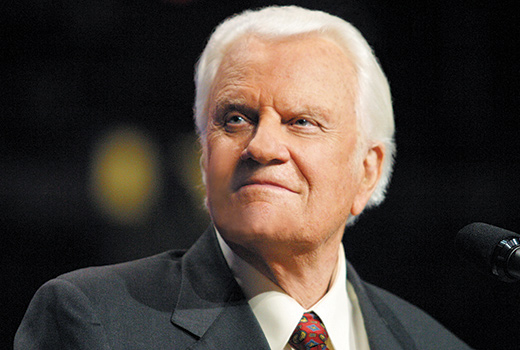I was sitting in Panera on Wednesday morning, Feb. 21, enjoying breakfast with a colleague, discussing race relations and the church, when the news of Dr. Billy Graham’s death flashed across my smartphone. I gasped, time stopped momentarily, and everything seemed to haze over. Then, powerful memories of this amazing servant of God filled my heart, mind and soul.
I began to imagine a world without the physical presence of Billy Graham. As a young boy in a pastor’s home, my family and I watched his crusades on television year after year with rapt attention. When I heard him preach, I knew what the love of God sounded like. Because of the influence of godly parents and the significant impact of Billy Graham, I became a follower of Jesus Christ and have never regretted that decision.
While a student at Southeastern Baptist Theological Seminary, I heard him speak in the chapel at Duke Divinity School. In a follow-up session after his sermon, I posed a question to him. In 1994, I attended his crusade in Atlanta, Ga. He drew people to Jesus through the language of love. Many embraced Jesus Christ that night in the Georgia Dome, their lives forever changed.
Throughout my adult life, I have been a passionate student of the evangelical movement. At Baylor University, I wrote my dissertation on Harold John Ockenga (1905-1985), the pastor of Park Street Church in Boston, Mass., and the “founding father” of modern evangelicalism. Ockenga became a significant mentor and trusted advisor to Billy Graham. He encouraged Graham to undertake a national radio program, “The Hour of Decision,” and the publication of an evangelical magazine, Decision, the BGEA’S popular religious magazine. He also prompted Graham to consider cross-cultural evangelism, which Graham entered into beginning in the mid-1950s through the doors of the Far East.
Graham never forgot Ockenga’s impact upon his life. At Ockenga’s funeral, Graham called him a “giant among giants.” Graham recounted how he never made a major decision without first calling and asking him for advice and counsel. Graham concluded, “Nobody outside of my family influenced me more than he did.” What set Graham apart was his receptivity to wise counsel and his profound gratitude for those who shaped him.
While a graduate student at Baylor University, I also taught two of Graham’s grandchildren, Jonathan and Morrow (the children of Anne Graham Lotz). Through them, I witnessed firsthand Graham’s legacy. Morrow bore the name of Billy’s mother. She possessed a strong and tender presence. I saw Ruth Graham, Billy’s wife, resonating in her. Jonathan had the towering presence and the commanding voice of his grandfather. As I graded Jonathan’s exams, I would often read aloud his responses to the essay questions. I literally heard Billy’s voice as I read them — cadence and content. After I would lecture, I would hear Jonathan say, without fail, “Great job,” and gesture toward me in the same manner and style as his grandfather. They carried his name with distinction and dignity.
Now, at this pivotal moment, the day of his homecoming, I am pondering his impact. He personified an irenic evangelicalism. He wasn’t angry; he didn’t lash out at others. He didn’t put down; he lifted up. He didn’t divide; instead, he unified. His was an invitational style, inviting everyone to the banquet table of Jesus Christ. And everyone seemed to listen.
He had a confident center that was non-negotiable, and that center was the cross of Jesus Christ. He majored on what mattered — i.e., the cross — and he eschewed what divided us. He had a simple message, and he never steered far off course. He believed that Jesus Christ was the answer to the dilemmas of our world. He believed that Jesus Christ’s death upon the cross broke down every barrier separating us from God. We simply needed to embrace that gift, the cross of Jesus Christ.
His message was believable, in part, because of his impeccable integrity. Early on, he dealt a blow to the demons that haunted evangelists. He set in place a standard of accountability, from which he never veered. Scandals never made their way into his life or his organization.
But all of this falls short in describing what sets Graham apart. I do not believe that any biography to date has captured his ineffable qualities. He’s more than a “prophet with honor” (William Martin) or “America’s pastor” (Grant Wacker). We can say that God had his hand on this man in a special way that set him apart. His influence and impact defies exact explanation. God called him and anointed him, and he responded with humility and simple obedience.
Now he is with Jesus. He’s home!
Thank you, Dr. Graham, for just giving us Jesus!
— John Adams is pastor of Easley First Baptist Church.

